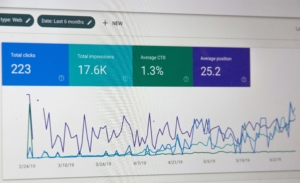How do I market myself as a mental health therapist?
As a mental health therapist, your expertise lies in helping individuals navigate through life’s challenges and find emotional well-being. Yet, in today’s digital age, having a strong online presence is crucial for reaching those who may benefit from your services. This is where search engine optimization (SEO) comes into play. By optimizing your online presence, you can ensure that your practice is visible to those seeking mental health support online.
Effective marketing strategies go beyond traditional methods. They embrace the power of digital platforms to connect with individuals seeking mental health support. From creating engaging website content to leveraging social media channels, there are various avenues for mental health therapists to showcase their expertise and connect with their target audience.

In this blog post, we’ll explore the fundamentals of marketing yourself as a mental health therapist in the online world. We’ll delve into the world of search engine optimization (SEO) and if you can do it independently! Whether you’re a seasoned therapist looking to enhance your online presence or a newcomer getting your name out there, this guide will provide valuable insights and practical tips to help you effectively market yourself and attract clients in need of your therapy services.
What is SEO marketing and how does it work?
SEO, or Search Engine Optimization, is the practice of improving and optimizing your website to increase its visibility and ranking on search engine results pages (SERPs). The goal of SEO is to attract organic (non-paid) traffic to your website by making it more relevant and authoritative in the eyes of search engines like Google.
- Keyword Research: Identifying the terms and phrases (keywords) your target audience uses when searching for products or services related to your business.
- On-Page Optimization: Optimizing individual web pages to rank higher and earn more relevant organic traffic in search engines. This includes optimizing titles, meta descriptions, headings, content, images, and more.
- Off-Page Optimization: Building backlinks (links from other websites to yours), social signals, and other external factors that influence your site’s credibility and authority.
- Technical SEO: Ensuring your website is technically sound and optimized for search engine crawling and indexing. This includes factors such as site speed, mobile-friendliness, crawlability, and site architecture.
- Content Creation: Producing high-quality, relevant, and engaging content that satisfies user intent and provides value to your ideal clients. Content can include blog posts, articles, videos, podcasts, and more.
- User Experience: Enhancing the overall experience of visitors to your website by providing seamless and intuitive navigation, fast page loading times, and mobile responsiveness.
- Local SEO: Optimizing your online presence to attract more local clients. This involves creating and optimizing Google My Business listings, and local citations. Also, ensure consistency in NAP (Name, Address, Phone Number) information across online directories.
Is SEO marketing worth it?
SEO for therapists can be highly beneficial in today’s digital age. With more people turning to Google to search for mental health services, having a strong online presence is crucial for attracting potential ideal clients. By investing in SEO strategies tailored to the mental health industry, therapists can improve their visibility on Google, making it easier for individuals seeking therapy to find them.
Moreover, SEO offers a cost-effective marketing approach compared to traditional advertising methods. While paid ads may provide immediate visibility, they require ongoing investment and can be costly in the long run. In contrast, SEO focuses on organic search results, allowing therapists to maintain visibility without continuous spending on advertising.
SEO fosters trust and credibility among potential clients. When a therapist’s website ranks high on search engine results pages, it signals to users that the therapist is reputable and trustworthy. Otherwise known as an EAT (expertise, authoritativeness & trustworthiness). This can be especially important in the mental health field, where individuals are seeking support from professionals they can rely on.
Although SEO marketing requires time and effort to see results, the long-term benefits for mental health professionals are undeniable. By optimizing their online presence and content for search engines, therapists can reach a wider audience, establish credibility, and ultimately grow their practice.

Can I do SEO on my own?
It is possible to tackle SEO independently! For therapists who have the bandwidth and expertise to delve into SEO strategies, there are numerous free SEO tools available that can aid in keyword research, content optimization, and performance tracking. These tools, such as Google Analytics and Google Search Console provide valuable insights. They look into website traffic, user behavior, and keyword trends.
For mental health professionals who may not have the extra time to dedicate to SEO efforts or lack the technical know-how, working with an SEO company can be highly advantageous. SEO professionals possess the expertise to develop tailored strategies that align with the unique needs of mental health practices. Additionally, they can provide ongoing support and guidance. This ensures that the therapist’s website remains optimized for search engines and attracts the right audience.
The decision to pursue SEO independently or with professional assistance depends on several factors. Such as the therapist’s resources, goals, and comfort level with digital marketing strategies. While DIY SEO is feasible for some, partnering with an SEO company can offer peace of mind and ensure that the therapist’s online presence is maximized for success.

How do I start SEO marketing?
Beginning an SEO journey as a mental health professional begins with comprehensive keyword research. Keywords are the phrases or terms that potential clients might type into search engines when seeking therapy services. To identify relevant keywords, mental health professionals can brainstorm common terms related to their practice. For example, “trauma therapist near me,” “counseling services in Lansing, Michigan,” or “anxiety therapy in Denver, Colorado.” Utilizing keyword research tools like SEMrush can further refine the list by providing insights into search volume, competition, and related keywords.
Once a list of target keywords is established, integrating them strategically throughout your website is crucial. This includes optimizing page titles, meta descriptions, headers, and body content with relevant keywords to improve search engine visibility. It’s important to create high-quality, informative content that addresses common questions and concerns within the mental health field. This helps you attract organic traffic and enhance your authority in your services niche.
By laying a solid foundation of targeted keywords and optimized content, mental health professionals can kickstart their SEO marketing efforts and increase their online visibility to connect with individuals seeking their services.
Ready to embark on the SEO journey?
As a mental health therapist, your passion lies in providing support and guidance to those in need. By embracing the power of digital marketing and SEO, you can extend your reach and connect with individuals seeking your therapy services online. Remember, SEO is not just about ranking higher on search engines; it’s about making meaningful connections with your ideal audience and fostering trust and credibility. If you want to learn more about SEO, follow the steps below! Simplified SEO Consulting is here to help you attract more organic traffic and connect with your ideal client.
- Schedule a consultation with us here!
- Learn more about SEO through our blogs.
- Start working on your SEO and watch your organic traffic increase.
Other Services We Offer:
We understand that each business has its own unique specialties. That’s why we provide a variety of SEO services! We cater to therapists, counselors, psychiatrists, and other professionals in the helping field. Alongside our DIY courses, we offer Done-For-You SEO packages, a 12-week intensive 1:1 SEO training program, and a Content Network service!
About the Author

Olivia Ferguson graduated from Central Michigan University with her Bachelor’s degree in Social Work. With a prior history in crime victim advocacy, this brought her great knowledge of the legal justice system and the mental health profession. Connecting those tools together, her goal is to help therapists reach their ideal clients by improving their online presence and rankings with SEO.




Leave a Reply
Want to join the discussion?Feel free to contribute!